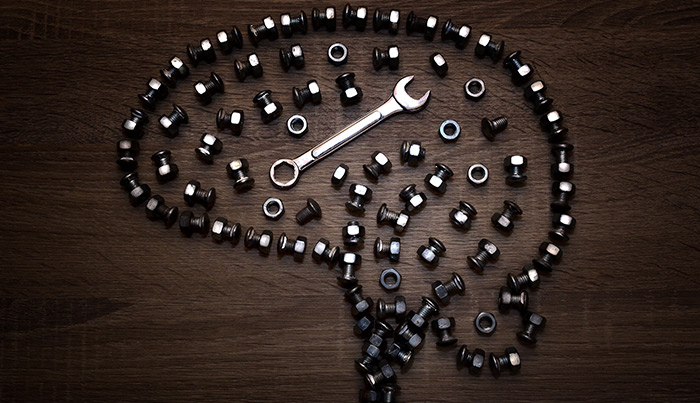What do you think of this article?
By Dr. David Woo - September 25, 2018

Transcranial Magnetic Stimulation (TMS) is proven to have long-lasting results in the treatment of major depressive disorder. TMS is an outpatient, non-invasive procedure that treats depression by applying electromagnetic pulses to the mood centers of the brain. Treatment usually consists of one course of treatment lasting six weeks.
Is one course of TMS treatment enough to relieve depression?
In a study done on the lasting effects of TMS treatment, researchers followed up for one year with patients who had experienced relief from depression after one course of treatment. Of these patients, 62.5 percent of patients continued to find relief from symptoms of depression, even one year after just one course of treatment (1). In this study, the patients also had the opportunity to be given more TMS treatment if they went back to experiencing symptoms. TMS was given to 36.2 percent of patients who experienced symptoms again during the one-year follow-up period in order to help prevent relapse.
Many TMS patients—like the majority of patients in this study—find relief from depression after the initial course of treatment and no longer need other forms of treatment, such as antidepressant medications or further TMS. However, that doesn’t mean that everyone experiences a completely depression-free life after one course of TMS. Is additional TMS an option for patients who do not have this level of success?
Can TMS be used as a form of treatment to maintain mood stability and prevent relapse?
TMS has been used as a form of maintenance treatment for patients who have experienced relapse into depression. TMS was approved by the FDA in 2008 to treat treatment-resistant depression, and the FDA acknowledges that follow up TMS treatment may be necessary for some patients (2). Studies have shown that additional TMS after the acute course of treatment may have a role in keeping patients well (3).
Let’s look at a few studies that experimented with ongoing TMS to treat relapse. In these studies, the researchers followed up with patients who had experienced relief from depression after their initial course of treatment.
A 2013 study from France compared two groups of patients who had completed TMS treatment: one group received ongoing maintenance treatment, while the other group received no maintenance treatment. TMS maintenance treatment consisted of two weeks with one session per week, then two months with one session every two weeks, and lastly two months with one session per month. The study found that the patients receiving maintenance treatment were less likely to experience a relapse of depression than the patients with no maintenance treatment (4). The study concluded that routine maintenance treatment was effective for preventing relapse.
A 2016 study from the United States, in contrast to the above study, concluded that additional TMS only as needed was the best approach. The researchers applied once-monthly TMS after initial treatment to one group. In the other group, they continued to follow up with the patients, applying TMS again only if the patient began to relapse into depression. The study found no significant difference in the relapse rates between the group that received routine maintenance treatment and the group that didn’t. The researchers did find that patients who had initially responded well to TMS have a higher chance of re-responding if relapse occurred (5).
While both of these studies concluded that TMS can be helpful in the treatment and/or prevention of the recurrence of depression, they did not agree on the best approach to practicing maintenance treatment. In both studies, not all study subjects experienced relapse into depression, and their relief from depression continued without further treatment.
What happens if you relapse back into symptoms of depression?
While TMS appears to have a potential role in maintenance therapy for people with treatment-resistant depression, more studies need to be done on the topic before any definite conclusions can be made. You can learn more about the TMS therapy success rate here. Consult with Dr. Woo about whether you would be a good candidate for relapse treatment, and whether your insurance would cover it. Learn more about how Madison Avenue TMS navigates insurance coverage for our patients.
References
- Dunner DL, Aaronson ST, Sackeim HA, et al. A multisite, naturalistic, observational study of transcranial magnetic stimulation for patients with pharmacoresistant major depressive disorder: Durability of benefit over a 1-year follow-up period. J Clin Psychiatry. 2014;75(12):1394-401. Link. Accessed September 18, 2018.
- US Food and Drug Administration. Class II Special Controls Guidance Document: Repetitive Transcranial Magnetic Stimulation (rTMS) Systems – Guidance for Industry and FDA Staff. Accessed September 20, 2018.
- Camprodon JA. Are We Ready for TMS Maintenance? Psychiatric News. 3 June 2016. Link. Accessed September 18, 2018.
- Richieri R, Guedj E, Michel P, et al. Maintenance transcranial magnetic stimulation reduces depression relapse: a propensity-adjusted analysis. J Affect Disord. 2013;151(1):129-35. Link. Accessed September 18, 2018.
- Philip NS, Dunner D, Dowd S, et al. Can Medication Free, Treatment-Resistant, Depressed Patients Who Initially Respond to TMS Be Maintained Off Medications? A Prospective, 12-Month Multisite Randomized Pilot Study. Brain Stimulation. 2016;9(2):251-7. Link. Accessed September 18, 2018.
- Peckel L. Repetitive TMS as Maintenance Therapy for Bipolar and Unipolar Depression. Psychiatry Advisor. Link. Accessed September 18, 2018.
Dr. Woo has been seeing patients in private practice since 2002, always with the goals of combining evidence-based medicine with psychodynamic psychotherapy and collaborating with other mental health professionals to ensure the best possible outcomes for his patients. He has been certified to administer TMS at his practice since 2017. His greatest clinical interests include helping patients suffering from depression, anxiety, and obsessive compulsive disorder.



